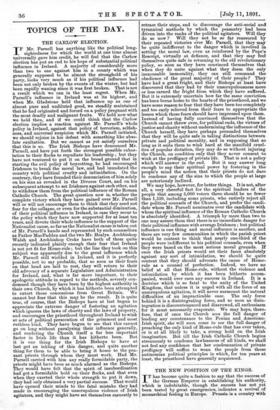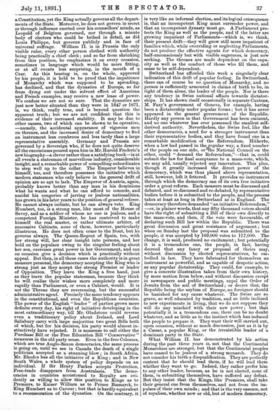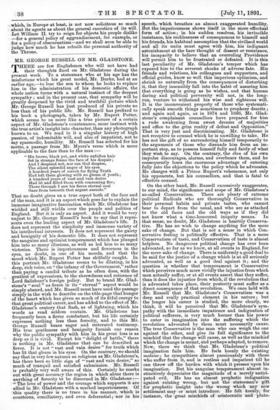THE NEW POSITION OF THE KINGS.
IT has become quite a fashion to say that the success of the German Emperor in establishing his authority, which is indubitable, though the success has not yet been tested by great emergencies, indicates a revival of monarchical feeling in Europe. Prussia is a country with a Constitution, yet the King actually governs all the depart- ments of the State. Moreover, he does not govern in secret or through influence exerted over his counsellors' minds, as Leopold of Belgium governed, nor through a minute body of electors who could be bribed in detail, as did Louis Philippe, but governs publicly and in face of universal suffrage. William II. is in Prussia the only visible ruler, every other person clothed with authority being practically a chief clerk ; and so far from shrinking from this position, he emphasises it on every occasion, sometimes in language which would be more fitting, or at all events less surprising, in the mouth of a Czar. As this bearing is, on the whole, approved by his people, it is held to be proof that the impatience of Monarchy which was supposed to be spreading, has declined, and that the dynasties of Europe, so far from dying out under the solvent effect of American and French examples, may receive a new lease of power. We confess we are not so sure. That the dynasties are just now better situated than they were in 1847 or 1871, is, we think, really true, and is beyond question the apparent truth ; but we are not confident that this is evidence of their increased stability. It may be due to other causes, two of which can be shown to be operative, —namely, the accidental appearance of vigorous men on thrones, and the increased desire of democracy to find an instrument less cumbrous and less tardy than a large representative assembly. Germany and Prussia are governed by a Sovereign who, if he does not quite deserve all the encomiums poured upon him-in Mr. Harold Frederic's new biography—a clever rather than a satisfying book—is at all events a statesman of marvellous industry, considerable insight; and a remarkable power of compelling subordinates to step well up to the collar. The Emperor believes in himself, too, and therefore possesses the initiative which modern statesmen who only believe in the general drift of opinion are so apt to lack. The Emperor of Austria, again, probably knows better than any man in his dominions what he wants and what he can afford to concede, and amidst his congeries of jarring or jealous nationalities, has grown in his later years to the position of general referee. He cannot always initiate, but he can always veto. King Humbert, too, is a strong man, like most of the House of Savoy, and as a soldier of whom no one is jealous, and a competent Foreign Minister, he has contrived to make himself the real master, or rather ultimate arbiter, of successive Cabinets, none of them, however, particularly illustrious. He does not often come to the front, but he governs always. The Queen-Regent of Spain, too, with her strong will, her clear insight into persons, and her hold on the populace owing to the singular feeling about her son, exercises great power in her Government, and can on occasion give a decision which is practically without appeal. But then, in all these cases the authority is in great measure personal, the democracy accepting the King who is strong just as they accept the strong Premier or leader of Opposition. They leave the King a free hand, just as they leave the popular statesman, because they think he will realise their wishes more completely and more rapidly than Parliament, or even a Cabinet, would. It is not the Throne they are reverencing, but the successful administrative agent. Precisely the same tendency appears in the constitutional, and even the Republican countries. The power of the English " leader " of parties grows more definite every day, his right of initiative developing in the most extraordinary way, till Mr. Gladstone could reverse even a traditionary policy about Ireland, and Lord Salisbury carry with large majorities two great Bills both of which, but for his decision, his party would almost in- stinctively have rejected. It is nonsense to call either the Purchase Bill or the Free Education Bill " Conservative " measures in the old party sense. Even in the free Colonies, which are true Anglo-Saxon democracies, the same process is snug on, until we see in Canada the death of a single politician accepted as a stunning blow ; in South Africa, Mr. Rhodes has all the initiative of a King ; and. in New South Wales, a whole system of policy depends on an individual. If Sir Henry Parkes accepts Protection, Free-trade disappears from Australasia. The demo- cracies in countries accustomed to Royalty are evi- dently as willing to allow this position to Kings as to Premiers, to Kaiser William as to Prince Bismarck, to King Humbert as to Cavour ; but that is hardly equivalent to a reconsecration of the dynasties. On the contrary, it is very like an informal election, and its logical consequence is, that an incompetent King must surrender power, and that an incompetent dynasty must go. A Parliament pro- tects the King as well as the people, and if the latter are growing impatient of Parliaments—which is, we think, their present drift—they will grow still more impatient of families which, while overriding or neglecting Parliaments, do not produce the effective agents for which democrany, half-unconsciously but with visible eagerness, is just now seeking. The thrones are made dependent on the capa- city as well as the conduct of those who fill them, and cease to be self-dependent.
Switzerland has afforded this week a singularly clear indication of this drift of popular feeling. In Switzerland, there can of course be no question of Monarchy, and no person is sufficiently. armoured in claims of birth to be, in right of them alone, the leader of the people. Nor is there any tendency in Swiss national affairs towards dictator- ships. It has shown itself occasionally in separate Cantons, M. Fazy's government of Geneva, for example, having been a dictatorship under popular forms ; but it has never appeared in the general government of the Republic. Hardly any person in that Government has been eminent, and no one whatever has ever possessed the smallest self- derived authority. Nevertheless, the Swiss feel, like the other democracies, a need for a stronger instrument than their representative bodies, and they have found one in a.
remarkable modification of the Referendum. Hitherto, when a law had passed in the regular way, a fixed number of the people on one side, or he National Council on the other, could. "demand the Referendum,"—that is, could submit the law for final acceptance to a mass-vote, which, we may add, usually rejected any innovation. This plan, though it greatly increased the direct power of the democracy, which was thus placed above representation, still, however, left it fettered. It provides no instrument through which the democracy can of its own free initiative order a great reform. Each measure must be discussed and debated, and re-discussed and re-debated, by representative bodies before it is submitted to the people, and the process takes at least as long in Switzerland as in England. The democracy therefore demanded "an initiative Referendum," —or, in plainer words, that any fifty thousand voters should have the right of submitting a Bill of their own directly to the mass-vote, and then, if the vote were favourable, of declaring such Bill law within the Republic. There was great discussion and great resistance of argument ; but when on Sunday last the proposal was submitted to the people, it was accepted by 169,000 votes to 117,000. The change, it is said, produced no excitement ; but potentially it is a tremendous one, the people, in fact, having decreed that any fancy or proposal of theirs may, without discussion by elected representatives, be em- bodied in law. They have fabricated for themselves an instrument as powerful, and as capable of despotic action, as any popular dictatorship. They could, for example, to give a concrete illustration taken from their own history, by mere motion from below, and without discussion except in newspapers and public meetings, expel the Order of Jesuits from the soil of Switzerland ; or decree that, the Republic being the asylum of Europe, no foreigner should be banished for any cause whatever. The Swiss are so grave, so well educated by tradition, and so little inclined to new experiments in living, that we do not suppose they will do any mischief with their new power but that potentially it is a tremendous one, there can 1;43 no doubt whatever, and as little as to the instinct which has induced the people to prepare it. They want their will carried out, upon occasion, without so much discussion, just as it is by a Caasar, a popular King, or the irresistible leader of a dominant party in the State. What William II. has demonstrated by his action during the past three years is, not that the Continental Monarchies are stronger, but that the Continental peoples have ceased to be jealous of a strong monarch. They do not consider his birth a disqualification. They are perfectly content that he should lead them, if he will lead them whither they want to go. Indeed, they rather prefer him to any other leader, because, as he is not elected, none of them, in submitting themselves, have suffered any defeat. But they insist that the Kings, like Premiers, shall take their general cue from themselves, and not from the im- pulses of their own minds ; and that is the very essence, not of royalism, whether new or old, but of modern democracy, which, in Europe at least, is not now solicitous so much about its agents as about the general execution of its will. Let William II. try to reign for objects his people dislike —for a general policy of aggrandisement, for example, or for a policy of obscurantism—and we shall soon be able to judge how much he has rebuilt the personal authority of the Throne.




































 Previous page
Previous page